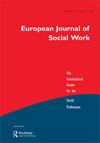Pflege in Zeiten der Pandemie. Wie sich Pflege durch Corona verändert hat
IF 1.6
3区 社会学
Q2 SOCIAL WORK
引用次数: 0
Abstract
to separate a nation from nationalism. When we turn to the publication, it is valuable to evidence how professionals are working – though they are attacked as protagonists of multiculturalism. The publication covers a broad range of crucial questions: how to deal with mixed integration in Italy? How to use clinical psychology to explore integration capacities? How to deal with trust, identity, and the mediator’s role? Moreover, the anthology presents a number of interesting case studies with respect to language, multicultural contexts and so on. In fact, a plethora of important issues to learn from. Three contributions deal with trafficking (apparently an increasing issue, which is often forgotten or at least underestimated). Sofija Georgievska (pp. 173–189) points to the increase and the importance of trafficking: ‘it is third in terms of criminal business after the drugs and arms trade’ (p. 173). Sic! – if you didn’t know, alas, your reviewer did not! A very instructive and informative contribution, which is emphasising the non-novelty of this issue, as trafficking has taken place in Europe for decades or more. Instead of giving up, the contribution refers to international law and how to defeat trafficking. The intention of the authors is to underline the complexity of the phenomenon, migration, and flight, and to expect the professionals to fight for the rights of migrants. They may play an important role, aiming at facilitating the relationships between migrant communities and host communities. As we know from here and there in Europa, this is not as easy as expected. Many citizens fear the ‘invasion’ and put pressure on politicians to maintain extreme and rigid regulations. Social democratic parties of the North were once upon a time cosmopolitan parties; this is not the case anymore. The Danish Social democratic party has turned into a nationalist party. Wonder what Marx or the Danish pioneers of the 1870s and 1880s would judge? Social democrats in first decades of the nineteenth century would have supported a German worker and not a Danish bourgeois. As Dylan once song, ‘The Times They Are A-Changin.’ Perhaps it is time to turn neoliberalism upside-down? At least, the evidence of this publication points to an increasing political responsibility of the professionals. We have experienced the lack of popular support. Let us do whatever we can to make this a populist issue and thereafter develop popular movements to change the course.在面对流行病时提供护理。什么样的在意会由Corona改变
把一个国家从民族主义中分离出来。当我们转向该出版物时,证明专业人士是如何工作的是很有价值的——尽管他们被攻击为多元文化主义的主角。该出版物涵盖了一系列关键问题:如何应对意大利的混合一体化?如何运用临床心理学探索整合能力?如何处理信任、身份和调解人的角色?此外,该选集还提供了许多有趣的案例研究,涉及语言、多元文化背景等。事实上,还有许多重要的问题需要学习。有三项贡献涉及贩运(这显然是一个日益严重的问题,经常被遗忘或至少被低估)。Sofija Georgievska(第173–189页)指出了贩运的增加和重要性:“就犯罪业务而言,它仅次于毒品和武器贸易,位居第三”(第173页)。Sic!–如果你不知道,唉,你的评论者不知道!这是一个非常有启发性和信息性的贡献,强调了这个问题的非新颖性,因为贩运在欧洲已经发生了几十年或更长时间。该贡献没有放弃,而是涉及国际法以及如何打击贩运。作者的意图是强调这一现象、移民和逃亡的复杂性,并期望专业人员为移民的权利而战。它们可以发挥重要作用,旨在促进移民社区和收容社区之间的关系。正如我们在欧罗巴所知道的,这并不像预期的那么容易。许多公民害怕“入侵”,并向政客施加压力,要求他们维持极端和严格的监管。北方的社会民主党曾经是世界性政党;现在已经不是这样了。丹麦社会民主党已转变为民族主义政党。不知道马克思或19世纪70年代和80年代的丹麦先驱会做出什么判断?19世纪头几十年的社会民主主义者会支持德国工人,而不是丹麦资产阶级。正如迪伦曾经唱过的一首歌:“时代在改变。”也许是时候颠覆新自由主义了?至少,这份出版物的证据表明,专业人士的政治责任越来越大。我们经历了缺乏民众支持的情况。让我们尽我们所能,让这成为一个民粹主义问题,然后发展民众运动来改变路线。
本文章由计算机程序翻译,如有差异,请以英文原文为准。
求助全文
约1分钟内获得全文
求助全文
来源期刊

European Journal of Social Work
SOCIAL WORK-
CiteScore
3.50
自引率
20.00%
发文量
96
期刊介绍:
The European Journal of Social Work provides a forum for the social professions in all parts of Europe and beyond. It analyses and promotes European and international developments in social work, social policy, social service institutions, and strategies for social change by publishing refereed papers on contemporary key issues. Contributions include theoretical debates, empirical studies, research notes, country perspectives, and reviews. It maintains an interdisciplinary perspective which recognises positively the diversity of cultural and conceptual traditions in which the social professions of Europe are grounded. In particular it examines emerging European paradigms in methodology and comparative analysis.
 求助内容:
求助内容: 应助结果提醒方式:
应助结果提醒方式:


